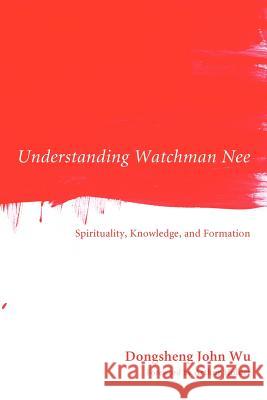Understanding Watchman Nee: Spirituality, Knowledge, and Formation » książka
Understanding Watchman Nee: Spirituality, Knowledge, and Formation
ISBN-13: 9781610975322 / Angielski / Miękka / 2012 / 286 str.
Understanding Watchman Nee: Spirituality, Knowledge, and Formation
ISBN-13: 9781610975322 / Angielski / Miękka / 2012 / 286 str.
(netto: 129,96 VAT: 5%)
Najniższa cena z 30 dni: 134,95
ok. 16-18 dni roboczych.
Darmowa dostawa!
Synopsis: This book situates Nee's view within the rich heritage of the Protestant, Catholic, and Eastern Orthodox spiritual traditions, and thus renders Nee's thought more intelligible to Christians of both evangelical and more liberal persuasions. In this book Dongsheng John Wu examines Watchman Nee's thought on the spiritual life, focusing on the relationship between spiritual formation and spiritual knowledge. Different ways of acquiring spiritual understanding are explored, including the respective roles of divine illumination, intellectual studies, and life circumstances. Understanding Watchman Nee begins by synthesizing strategic aspects of Nee's teachings as well as formative events and sources in the development of Nee's own spirituality and theology. It then utilizes the critical work of contemporary theologian Mark McIntosh to bring Nee's voice into dialogue with some important figures in the history of Christian spirituality. Such interactions reveal that Nee's crucial theological convictions exhibit strong parallels with related themes found in the church's spiritual or mystical treasures. Endorsements: "Using the critical work of American Episcopal theologian Mark McIntosh, Dongsheng] Wu offers a creative approach to Nee's view of spiritual knowing and spiritual life, one that shows the depth and insight of Nee's thought on such subjects as divine illumination and union with God . . . Wu puts Nee in a Christian spiritual tradition that has deep roots in Protestant mysticism and creative possibilities for today." --Philip L. Wickeri Advisor to the Archbishop on Theological and Historical Studies Hong Kong Sheng Kung Hui (Anglican) Hong Kong SAR, China Adjunct Professor of Interdisciplinary Studies, The Graduate Theological Union, Berkeley, CA, USA Author Biography: Dongsheng John Wu (PhD Graduate Theological Union, Berkeley) has taught spiritual formation courses at Regent College in Vancouver, Canada. He is an ordained pastor in the Free Church tradition
Synopsis:This book situates Nees view within the rich heritage of the Protestant, Catholic, and Eastern Orthodox spiritual traditions, and thus renders Nees thought more intelligible to Christians of both evangelical and more liberal persuasions. In this book Dongsheng John Wu examines Watchman Nees thought on the spiritual life, focusing on the relationship between spiritual formation and spiritual knowledge. Different ways of acquiring spiritual understanding are explored, including the respective roles of divine illumination, intellectual studies, and life circumstances. Understanding Watchman Nee begins by synthesizing strategic aspects of Nees teachings as well as formative events and sources in the development of Nees own spirituality and theology. It then utilizes the critical work of contemporary theologian Mark McIntosh to bring Nees voice into dialogue with some important figures in the history of Christian spirituality. Such interactions reveal that Nees crucial theological convictions exhibit strong parallels with related themes found in the churchs spiritual or mystical treasures. Endorsements:"Using the critical work of American Episcopal theologian Mark McIntosh, [Dongsheng] Wu offers a creative approach to Nees view of spiritual knowing and spiritual life, one that shows the depth and insight of Nees thought on such subjects as divine illumination and union with God . . . Wu puts Nee in a Christian spiritual tradition that has deep roots in Protestant mysticism and creative possibilities for today."--Philip L. WickeriAdvisor to the Archbishop on Theological and Historical StudiesHong Kong Sheng Kung Hui (Anglican)Hong Kong SAR, ChinaAdjunct Professor of Interdisciplinary Studies,The Graduate Theological Union, Berkeley, CA, USAAuthor Biography:Dongsheng John Wu (PhD Graduate Theological Union, Berkeley) has taught spiritual formation courses at Regent College in Vancouver, Canada. He is an ordained pastor in the Free Church tradition











